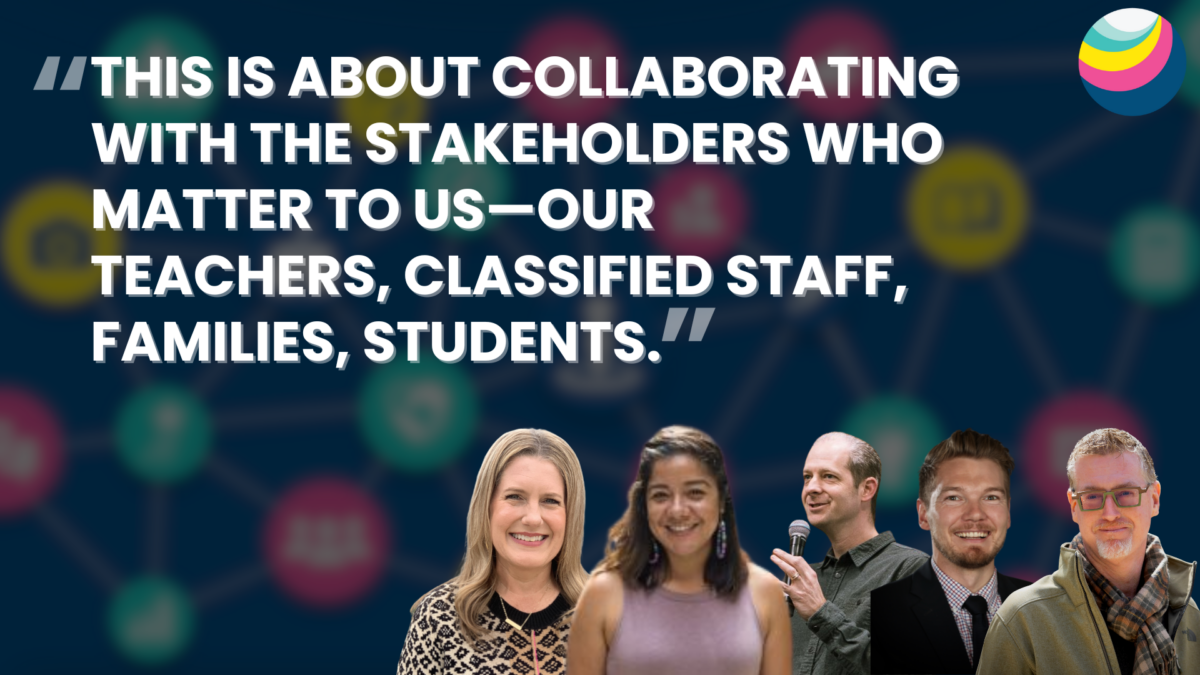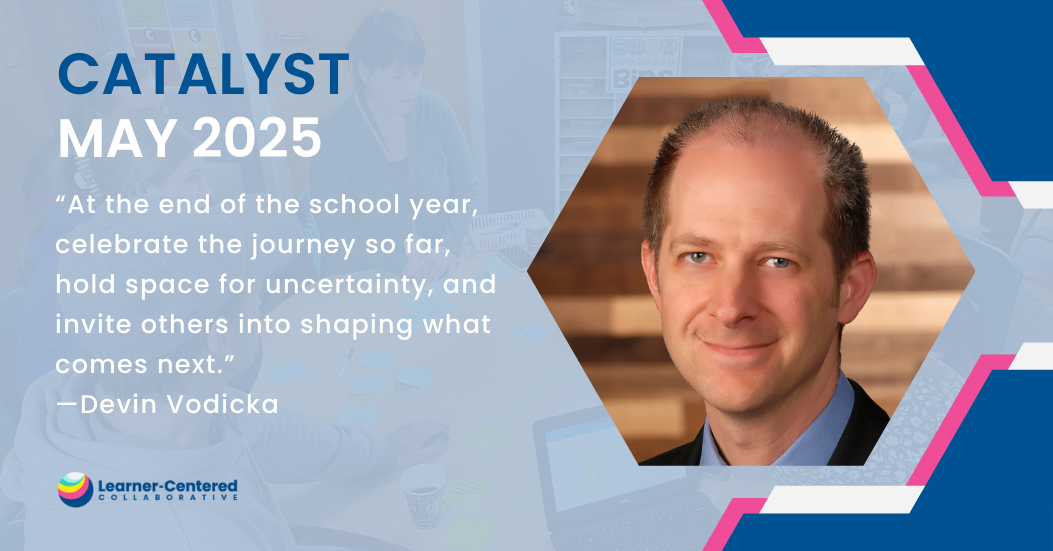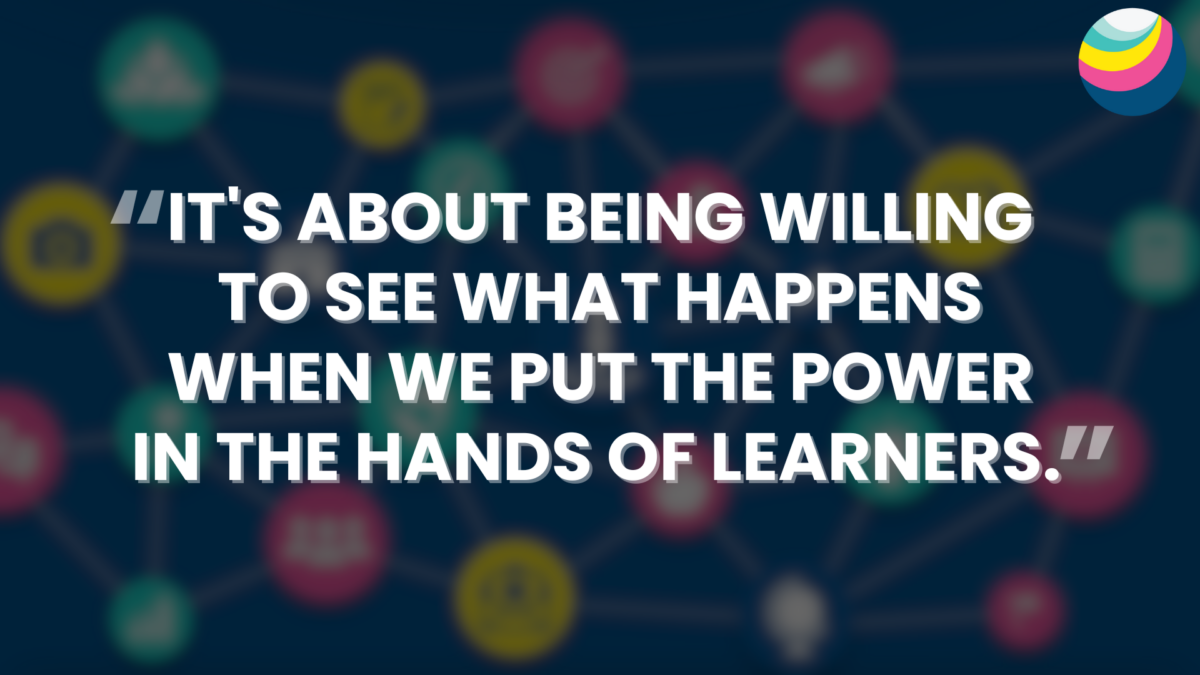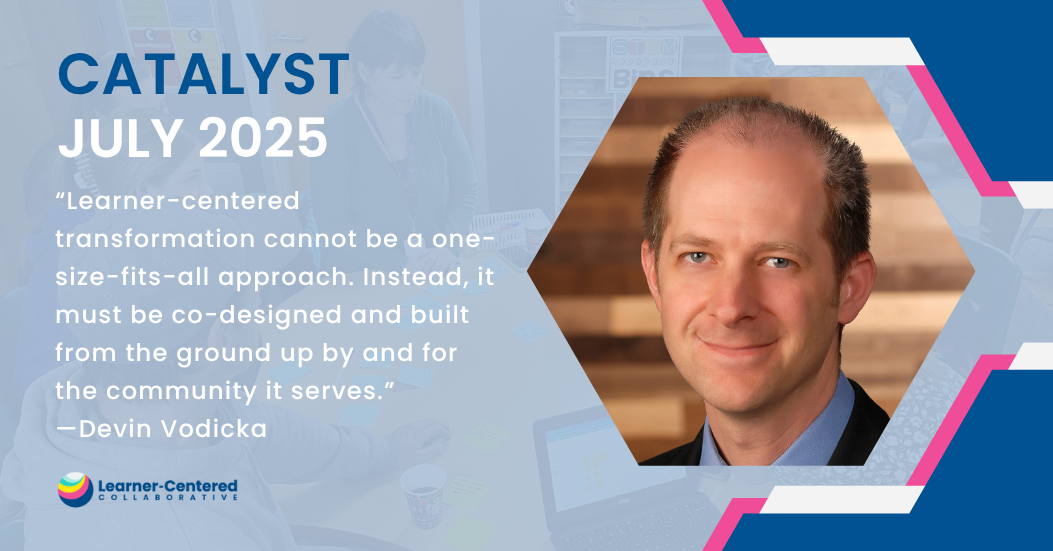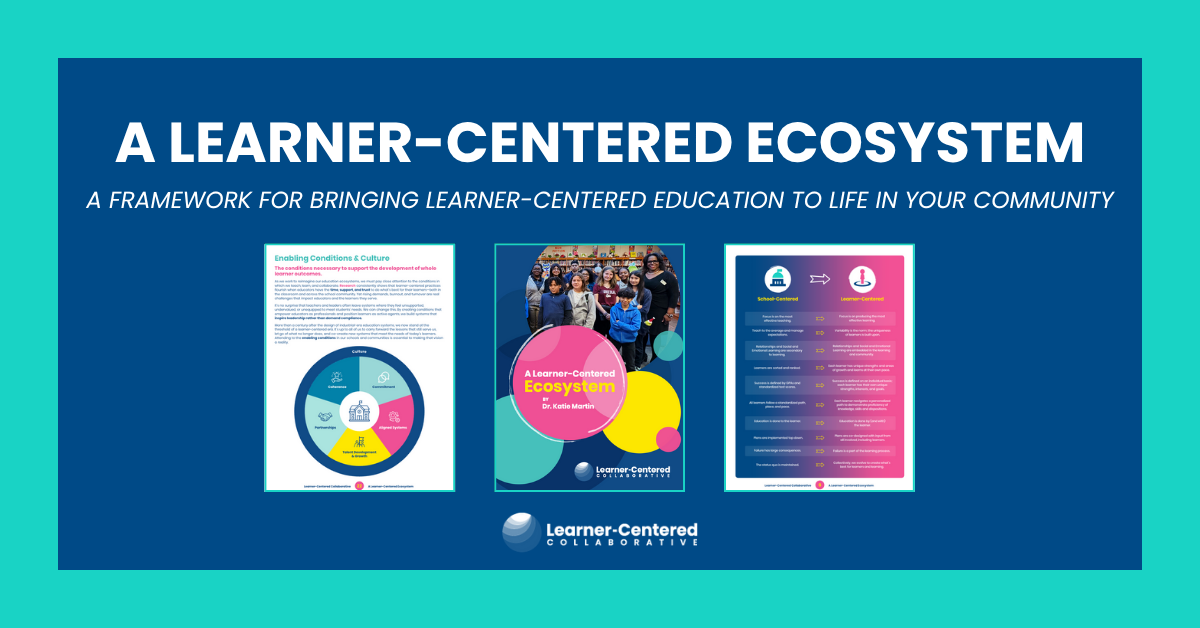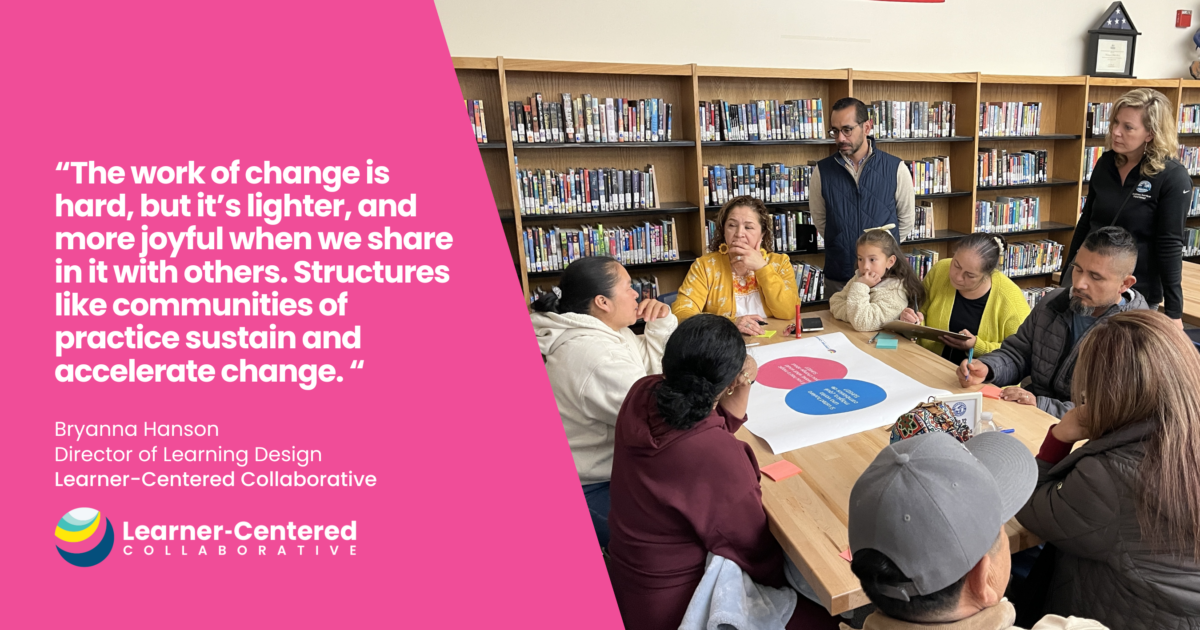You Are More Ready for Learner-Centered Than You May Think
The number one question I get about our work at the Learner-Centered Collaborative is “What does learner-centered mean?” I share that we (like so many parents and educators out there) envision education ecosystems that empower all learners to know who they are, thrive in community, and actively engage in the world as their best selves. Once that’s covered, the second most frequent question comes: “When is that ever going to be possible?”
The reality is that learner-centered education has never been more possible and, if you’re a teacher, school leader, or parent, you are more ready than you think.
How will you know when you’re ready to shift to learner-centered?
- You put relationships first.
- You acknowledge what learners do well instead of focusing on their weaknesses.
- You are aware of implicit bias.
- You have mourned the loss of the system that raised you.
Getting started or already on your learner-centered journey? Discover your next step with our diagnostic quiz.
Below are a few examples and anecdotes from my learner-centered education journey that touch upon each of these readiness indicators.
Putting relationships first
Admittedly, I used to think the “getting to know you” stuff was fluff. In hindsight, that couldn’t have been farther from the truth. The most impactful learning experiences I’ve ever had were always grounded in relationships with teachers, coaches, and classmates.
Yet, when I stood in front of 33 8th graders in the center of Harlem my first year of teaching, all I could think about was the 80% mastery of standards goal and the 500-page book of discipline strategies my mentor gave me to use when, as was bound to happen, my students didn’t do what they were “supposed to do.”
I repeated the mistake of “content first” for a number of years until I met Anthony, a thirteen-year-old firecracker of a personality who could simultaneously make me laugh hysterically and scream with frustration. It was Anthony who suggested we start our reading groups by going around in a circle to share a highlight from the previous day. This started the day with smiles, giggles, and a really cool way to learn more about each other. It also resulted in significantly more reading growth than any other small reading group in the school. Putting relationships first, whether through small daily acts (like Anthony’s pleasantries) or larger experiences (think ropes course or identity workshops), is more powerful, more effective, and – let’s be honest – more fun.
Katie Martin shares 4 strategies that focus on connection over content.
Acknowledging what learners do well instead of focusing on their weaknesses
If you’re like me, you’ve spent a lot of time in PD reframing “weaknesses” and replacing that word with euphemisms like “areas of growth.” The reality was it took me a long time to divert that mental energy toward acknowledging what learners do well.
One of the most fun years of teaching I had was as an 8th grade Social Studies teacher. Learners and I spent the year building toward a 90-minute, learner-led, mock trial about the West Memphis Three. The trial necessitated multiple roles (jury, lawyers, witnesses, bailiff, etc.) and rather than placing learners in roles they were “weak” in to grow their “skill gaps,” we collaboratively determined roles together. I’ll admit that I thought the bailiff was not as challenging as the lawyer role but it proved to be a powerful learning experience for Theresa. Theresa was tough and her peers listened to her (or were afraid of her?!?). We used the role to highlight those strengths Theresa already had and to build her agency to leverage the right strategy at the right time. With practice, Theresa honed and refined her ability to get others to listen and understand her guidance more effectively (and dare I say, without fear tactics!).
Acknowledging what people do well, rather than focusing on their weaknesses, will always cultivate more learning and growth.
At Learner-Centered Collaborative starting with strengths is embedded in our culture and all the work we do. Meet our team and learn about each of our strengths!
Being aware of implicit bias
I now lead a team and have two sticky notes above my desk. One of them reads:
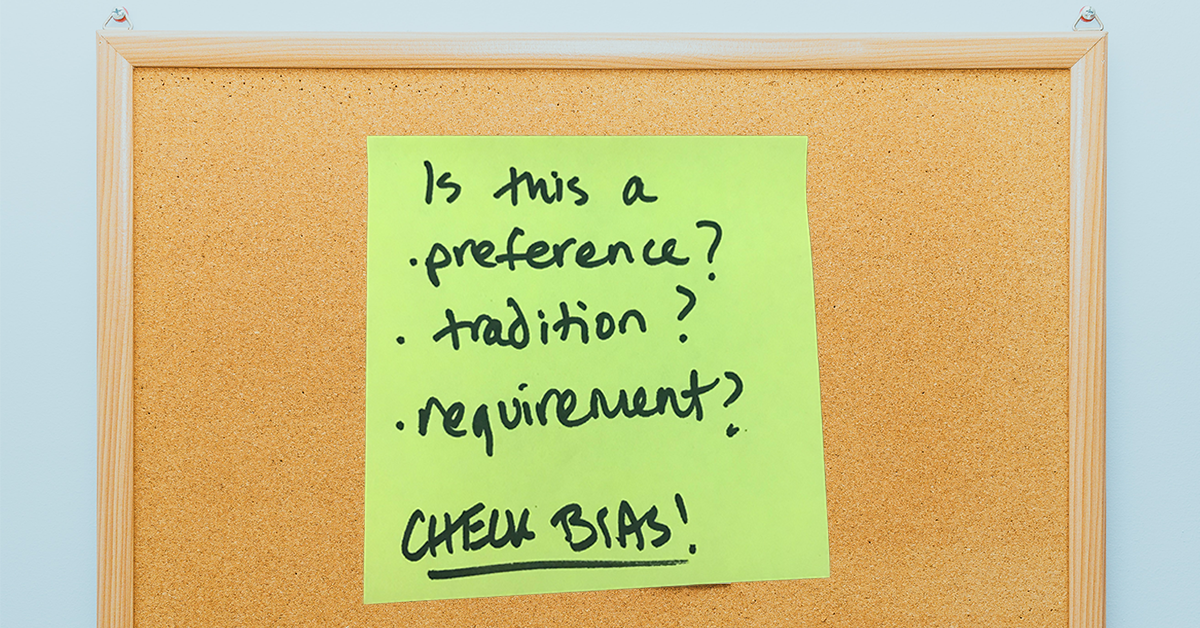
Though these questions are critical as I navigate organization-wide decisions and processes, the questions are equally important and valuable when working with learners.
For example, when I taught 7th grade Reader’s Workshop, as a class we collectively created agreements for how we’d spend our independent reading time, and after each session we’d use a rubric to reflect on how we did. A group of girls strongly advocated for an agreement to “freely choose seats.” The preferences in my brain screamed, “No way! It would be easier to just assign them seats!” The tradition in me yelled, “I read in these hard chairs and I turned out fine!” My preference and educational traditions are full of bias. It wasn’t until I examined the true requirements of independent reading that I checked myself. So our class decided to do free choice seating, we created a rubric and, after each session, we asked ourselves, “Did our seat choice today enable us to get lost in our book?”
You could ask yourself these questions for nearly any decision you make in your classroom and you’ll learn a lot about yourself while supporting more learners in the process.
Mourning the loss of the system that raised you
I saved the best, and perhaps the hardest, for last. This one didn’t dawn on me as an indicator of “readiness” for learner-centered until Parker, my now 4-year-old daughter, started preschool (not to be confused with daycare!). For years I have, in my work and in my mind, acknowledged and talked about the problematic factory model system of education that fails to meet the needs of all learners. Yet that system is still the one I know the most deeply, the one that shaped much of my own spirit and life, and the one that, like it or not, is my default. The alternative to my default is a wide open world of unknowns.
My default is to understand the school experience in terms of what is “done” each day. This is surely the genesis of the classic dinnertime conversation that goes something like: “What did you do in school today?” “Nothing.” To truly get at what I believe to be important about my daughter’s school day I must shift my line of questions and recognize and embrace the evidence of learning in her answers, after her learning should be about what is authentic, relevant, and personal to her:
| Learner-centered outcome | Questions to ask | A 4-year-old’s answers |
|---|---|---|
| Agency | What did you learn about yourself today? | “I don’t like laying down during nap time because I get cold.” |
| Collaboration | How did you help a friend today? | “I showed Leonardo how to build a fire – a pretend fire – so we could roast marshmallows.” |
| Real-World Problem Solving | What did you learn about the world today? | “Firefighters come to school when the alarm goes off.” |
To embrace the world of unknowns in a learner-centered system I first have to pay the old system respect and mourn my loss. And, I can’t let that mourning process delay what’s right for Parker now. Like that voice Elsa hears in Frozen II (if you have a four-year-old, you know), it would be much easier to go about our days and ignore the scary unknown. But, like Maya Angelou says, “When you know better, do better.”
In discussions with educators, parents, and school leaders, I’ve found that most are on a continuum when it comes to these four readiness indicators. Together, with shared ‘learner-centered’ language and examples in practice, we can all continue on this journey – hopefully with renewed purpose and passion!
Feeling more ready than you think to jumpstart your learner-centered journey? Check out our educator workshops, downloadable tools, or get in touch with our team to discuss learner-centered education in your context.
